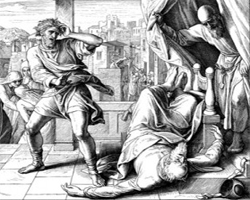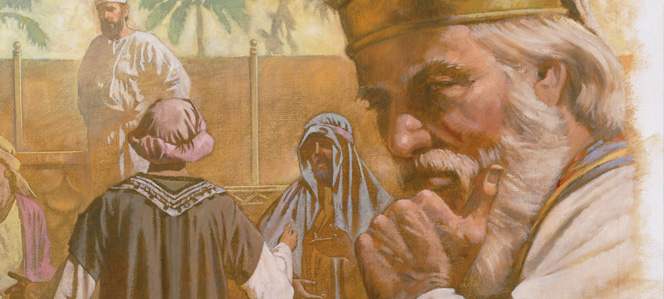Biblical Wisdom for Troubled Times
By Rev. Robert Barron / From Catholic New World
 I was recently scheduled to address the priests of the Archdiocese of Boston, but bad weather rolled into O’Hare, and my flight was cancelled. However, I’d like to share with you some of the insights I had intended to offer to the Boston priests. As you know, Boston was the epicenter of the clergy sex abuse scandal that came to light in 2002 and that continues to shake the church around the country and around the world. I struggled rather mightily to prepare this talk, for I didn’t want to dwell on the difficulties, and I wanted, above all, to give these priests a sense of hope, but I knew I had to make some reference to the scandal. I decided to take my own advice (cf. an article that I wrote some weeks ago) and look at the issue through biblical eyes.
I was recently scheduled to address the priests of the Archdiocese of Boston, but bad weather rolled into O’Hare, and my flight was cancelled. However, I’d like to share with you some of the insights I had intended to offer to the Boston priests. As you know, Boston was the epicenter of the clergy sex abuse scandal that came to light in 2002 and that continues to shake the church around the country and around the world. I struggled rather mightily to prepare this talk, for I didn’t want to dwell on the difficulties, and I wanted, above all, to give these priests a sense of hope, but I knew I had to make some reference to the scandal. I decided to take my own advice (cf. an article that I wrote some weeks ago) and look at the issue through biblical eyes.
I chose to focus on two texts from the Old Testament, the first from the opening chapters of the first book of Samuel and the second from the sixth chapter of the second book of Kings. As the first book of Samuel gets underway, we hear about Eli, the high priest at Shiloh. He is presented to us as blind, tired, and spiritually out of touch—an ineffective leader for Israel. More to it, he has two wicked sons, Hophni and Phineas, who are, like their father, priests but who are using their priesthood to take advantage of the people who come to them for help. We hear that many called out to Eli, urging him to discipline his sons, but he refused. Does any of this sound familiar: corrupt priests who use their office to harm the people and a supervisor who miserably fails to correct them?
What followed upon this deep corruption was disaster for Israel. God permitted the Philistines to rout the Israelite army, killing 30,000 foot soldiers, killing Hophni and Phineas, and carrying the Ark of the Covenant off into captivity. This last outrage was probably the most devastating, since it was tantamount to ripping the heart out of the nation. We are told that a single soldier escaped from the field of battle, ran to Shiloh, and delivered the news to Eli. Upon hearing of the total catastrophe, the old man keeled over, broke his neck and died. Does any of that sound familiar? The Church, which Paul calls “the new Israel,” is passing through a catastrophic period, a Long Lent, a perfect storm. As the waves of the clergy sex abuse scandal wash over us, we wonder whether the Church will survive, and we feel, perhaps, that the heart of the Church has been ripped out. And it appears as though we are surrounded by armies of our enemies.
It is most important to note that for the Biblical authors, God is active in all things and at all times, both when Israel flourishes and when Israel suffers. God steadily loves his people, but that love appears in differing guises according to circumstances. The deaths of Eli and his sons, the wiping out of the Israelite army, the humiliation of the entire nation through the capture of the Ark were construed as the means by which Yahweh was cleansing and purifying the people, ridding them of sin and preparing them for renovation. The first book of Samuel opens with the cry of Hannah, a barren Israelite woman begging God for a child. With his customary pastoral sensitivity, Eli accused her of being drunk in church, but Hannah protested that she was passionately invoking God. Though Eli wouldn’t listen, God did—and Hannah gave birth to Samuel who, come of age, became the great prophet and re-founder of the nation, the one who rallied the people and anointed David as King. The very best rubric under which to read the Old Testament texts is this: God bringing life out of death, opportunity out of impossibility. We see this motif over and over again—in the stories of Abraham, Jacob, Joseph, Moses, David, Isaiah, the Maccabees, etc., etc. When things are, from the purely human standpoint, hopeless, God opens up a path. So in the story under consideration, even as God permits the painful cleansing of Israel, he is already preparing its salvation.
The questions I planned to pose to the priests of Boston—especially the younger brothers—were these: are there any Samuels among you? Are there any among you who are being raised up by God to be specially dedicated to him and to lead the renovation of the church? Are you ready to endure the chastisement and accept the challenge?
The second biblical story I considered is a fairly obscure narrative dealing with the prophet Elisha. We hear that Elisha had raised the ire of the King of Aram and that the King had, accordingly, surrounded the little town of Dothan where Elisha lived along with a number of young aspiring servants of God. When one of Elisha’s charges saw the assembled host, he turned to the prophet in terror and said, “Alas, master, what shall we do?” Elisha remained utterly calm and replied, “Do not be afraid, for there are more with us than are with them.” A word that I’ve often used to describe what it feels like to go through the sex abuse crisis is “beleagured.” It feels as though the church and the priesthood are surrounded by enemies, peering at us, questioning us, laughing at us and suspecting the worst of us. And I confess to feeling often like Elisha’s student as he gazed, horrified, at the army encamped against him.
Now what did Elisha see? What gave him such blithe confidence? He saw the power of the invisible world, the realm of the spirit, the kingdom of God. The creator of the entire universe is not something within the visible world; rather he is a spiritual power whose name is “love.” When we call upon that love, we get in touch with the greatest force in existence, the power that mocks any of the powers of this world. There are always “more with us than are with them.” I asked the beleagured priests of Boston to believe this central Biblical message and to act on their belief.
After Elisha made his statement, he asked the Lord to reveal to his young student what the prophet had seen. So God opened the young man’s eyes and he saw that “the mountain was full of horses and chariots of fire all around Elisha.” These are the spiritual forces: the angels, the saints, and the infinitely intense presence of God. I ask the elder priests of Boston to minister to their younger brothers as Elisha did to this student, passing on to them a spiritual vision, and teaching them to use the tools by which to access the transcendent powers. In this way, they will help them to find the courage to withstand, to resist, and to thrive. Vatican II encouraged us to read the signs of the times. I intended to tell my brother priests that if we read our times with biblical eyes, we will face some terrible truths, but we will, finally, find hope.
